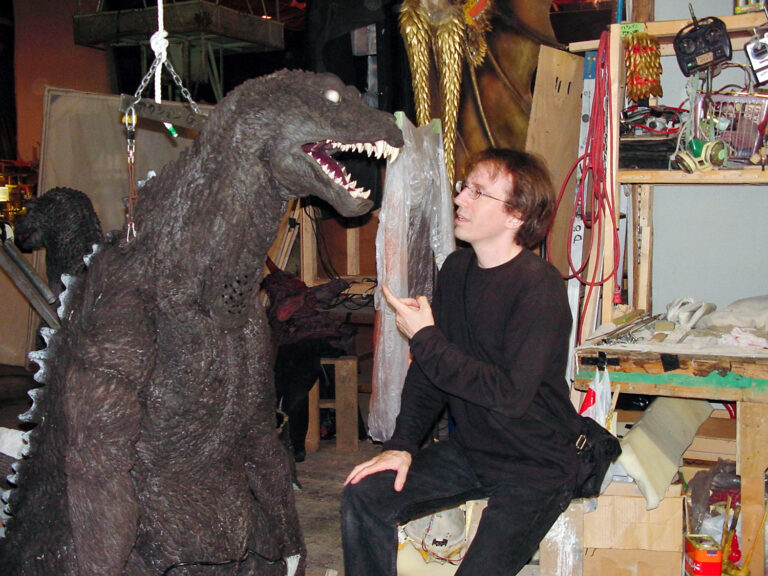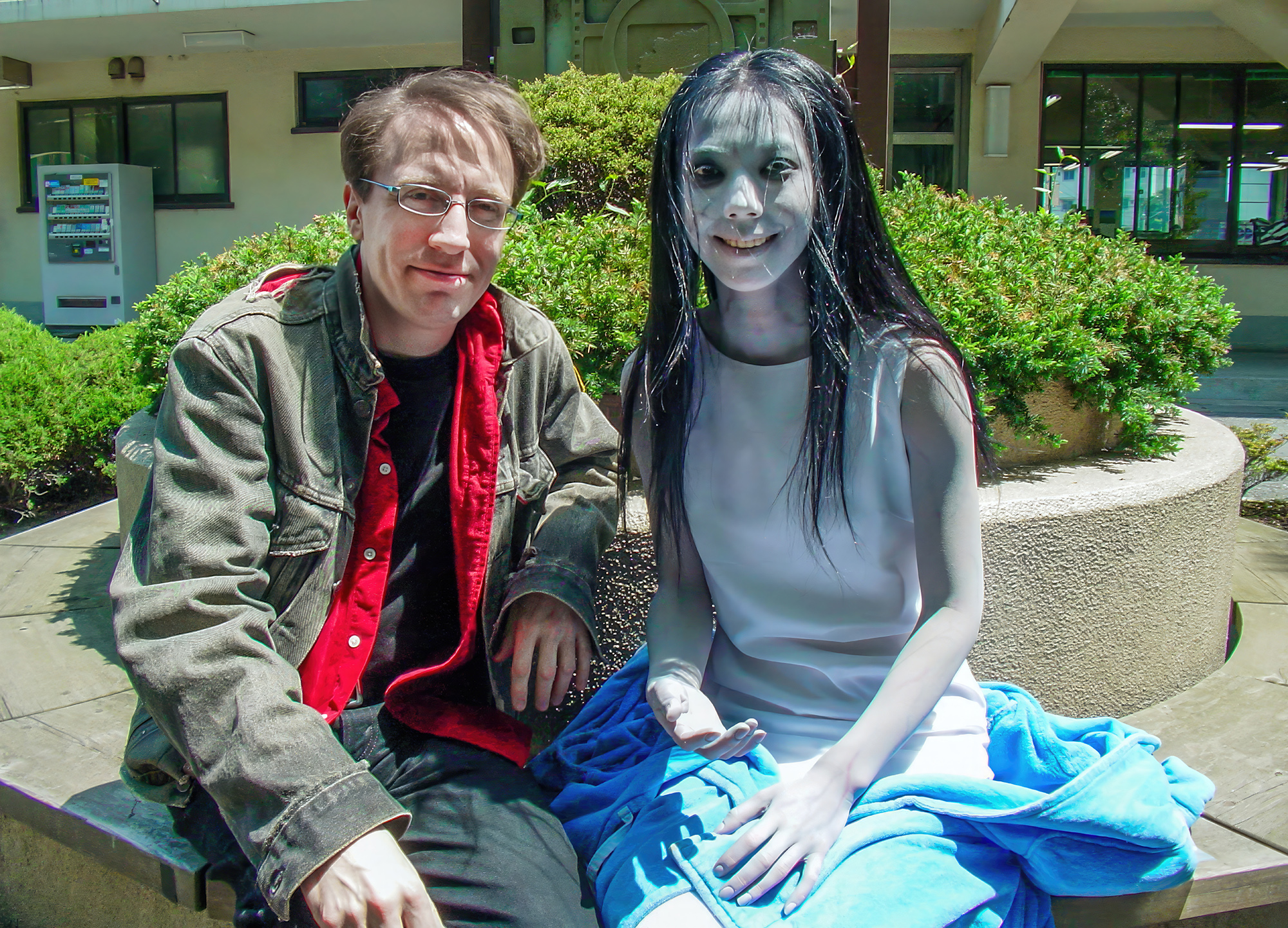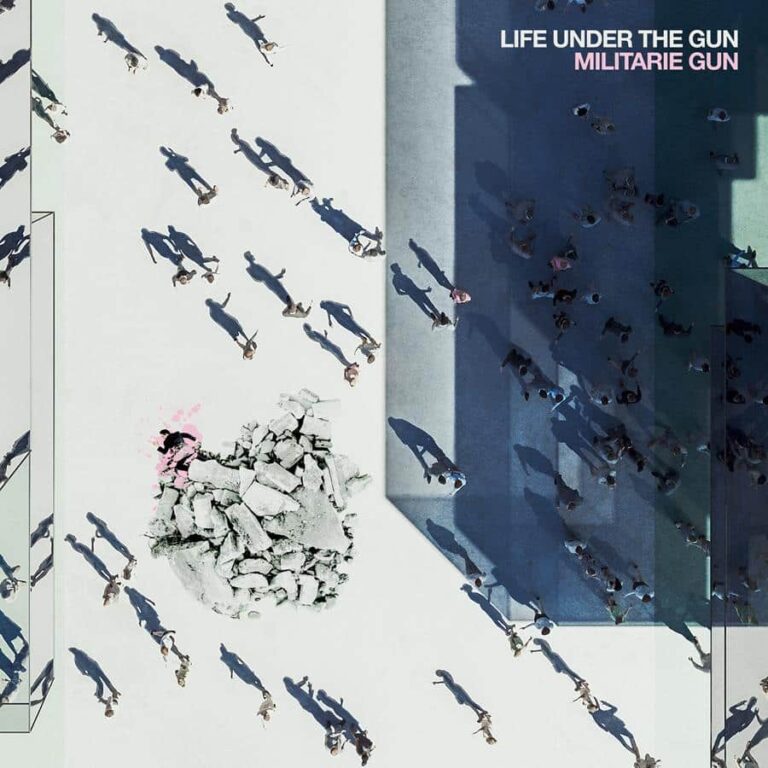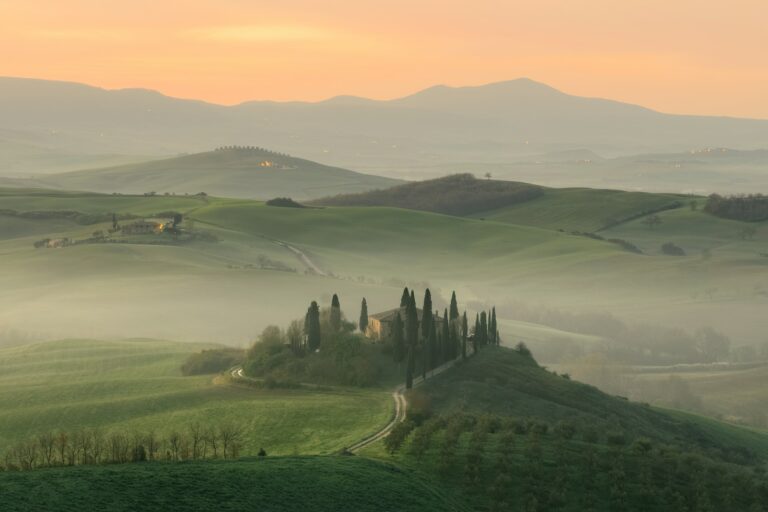In 2021, Japan-based author Norman England published his first English language book, Behind the Kaiju Curtain: A Journey Onto Japan’s Biggest Film Sets. Documenting the writer’s time visiting Japanese monster movie productions in the late ‘90s and early 2000s (namely Shusuke Kaneko’s 2001 Godzilla, Mothra, King Ghidorah: Giant Monsters All-out Attack), the book captured not only details regarding the films’ makings but—more uniquely—the Japanese film set culture. England’s access to these sets came in part due to freelancing for Fangoria magazine, for which he wrote, by his estimate, enough material to fill seven or eight issues. And now, his genre pieces—for that publication as well as outlets such as Sci-Fi Teen and The Japan Times—have been amassed into a single volume titled Ring of Fear: Dispatches from the Trenches of Japanese Genre Film Sets.
In his introduction, England notes various circumstances led to him moving on from film reporting (changes at Fangoria; the decline of the J-Horror boom; an urge to become more involved in the film industry) but that he long considered re-releasing his reporting work as a collection. The results are well worth the attention of any serious Japanese film fan. Ring of Fear contains eighty-one articles on everything from monster movies (including Godzilla flicks not covered in Behind the Kaiju Curtain) to ghost stories. Besides documenting on-site incidents and behind-the-scenes information, the author speaks to reputable directors such as Kaneko, Takashi Shimizu, Hideo Nakata, and Nobuhiko Obayashi. He also picks the brains of cast members, producers (a piece on Shogo Tomiyama, who oversaw Godzilla in the ‘90s and 2000s, is a personal favorite of mine), special effects technicians, and monster suit actors. All this lush detail supported by a plethora of photographs from the sets, interviews, and premieres.
In this interview with Our Culture, England recalls his time covering Japanese genre film sets.
First off, thank you for collecting your genre writings and making them accessible with this volume. In your introduction, you describe yourself as a kaiju enthusiast before moving to Japan. Did you have a pre-existing interest in Japanese horror, the other major genre covered in this book?
I knew little about Japanese horror before moving to Japan in 1993, but that’s how it was back then. In those days, Japanese cinema to Westerners was either art-house fare or giant monsters, which wasn’t really anyone’s fault as horror in Japanese cinema is actually a recent phenomenon. My understanding of the Japanese “atmospheric” horror style began after moving to Japan and noticing how deeply rooted it was in the culture. For example, temples are stocked with all sorts of creepy statues of oni (toll-like demons) and otherworldly creatures, and their holiest spots are often damp and set in deep shadows. Japanese homes are poorly lit, too, with nearly all having an altar to deceased family members; it’s something explained quite well in Ring of Fear by The Grudge director Takashi Shimizu. TV shows featuring “mystery spots” in Japan and cases of paranormal events, such as photos of a blurry ghost over a person’s shoulder, were popular when I moved here, as were horror manga. I don’t know if all of this is “horror” per se, and one can find similar things in Western culture. Still, the Japanese fascination with creepy stuff wasn’t anything I expected when arriving, but as a horror fan, I was grateful to discover it.
Your previous book, Behind the Kaiju Curtain, goes into great detail about your time on kaiju film sets—including crash courses in Japanese film set culture. Did you experience similar learning curves while reporting on the films covered in Ring of Fear?
When I covered the so-called J-Horror genre for Fangoria, there was pretty much no information in English available on the subject. So, I went into interviews somewhat naive. Japanese people are generally patient and the filmmakers did their best to educate me. In particular director Norio Tsuruta (Ring Ø, Dream Cruise, Premotion). As one of the few directors I’ve met in Japan wholly dedicated to the horror genre, he was determined that I, being the Fangoria guy in Japan, understand what sets horror in Japan apart from horror in the West. We had a lot of great chats and I visited a few of his film sets, which are covered in Ring of Fear.
In the course of your film reporting, you interviewed a large number of people. When you look back, who was your favorite person to interview? Was anyone particularly difficult to interview?
It’s hard to say who my favorite was as I never experienced a particularly bad interview, although some filmmakers expressed themselves better than others. Offhand, the more eloquent directors in Ring of Fear are Shusuke Kaneko, Nobuhiko Obayashi, and Hideo Nakata. But then, directors are directors because they know how to communicate. Actors tend to be hit or miss. Surprisingly, Yumiko Shaku was sharper than I’d expected during our time together on Godzilla Against Mechagodzilla. I’ve had bad interviews with actors but bad only because they can’t form their thoughts well. I interviewed the star of a big horror franchise in Japan and, I swear, she couldn’t answer a thing. It was her manager that told me what I needed to complete my coverage. It was an early interview of mine, and it taught me to feel out actors with small talk before turning on the tape recording. If they showed the ability to express themselves, I’d ask the more biting questions; if not, I kept things basic.
Most of the articles in this book were originally published in Fangoria, but you also have pieces from publications such as the newspaper The Japan Times. Were there differences/challenges in writing for a daily news publication versus a genre magazine?
I’d been writing for Japanese publications since around 1995; Fangoria was my debut as a professional writer in English. That was in 1997. At the time, I was given a word count between 3,000~3,500. When the Internet encroached on sales in around 2004, to have more variety in the magazine, the word count dropped to around 1,000~1,500. This was annoying because it still took the same amount of legwork, and I got paid less. As for newspaper style, I did a few pieces for The Japan Times, but honestly, I couldn’t get with the brevity of the style. I enjoyed the opportunity but didn’t feel like myself when I wrote those kinds of terse sentences. I like being playful in my writing, and there’s little room for that in newspapers.
You’ve also directed films in Japan. Did your time on Japanese film sets influence your approach to making movies and, if so, in what way?
After having spent almost 200 days on various film sets, I decided to put what I’d learned to the test. The result was The iDol, my first film, which I shot in 2005, is available in the US on the SRS Cinema label. I felt, too, that making a film would aid my reporting as it would connect me with the filmmakers and give me a deeper understanding of what they were up against when making films. After that, I directed a few other things, such as Bringing Godzilla Down To Size, a film about the art of kaiju cinema, and New Neighbor, a kind of horror film released in the West on the Midori Impuls label.
Although less involved in the film journalism circle, you’re still involved in the Japanese film industry. Can you tell the readers what you currently do for a living?
I got out of reporting once I moved into the production side of Japanese films, where I’d do almost anything and everything: directing, acting, sound, and dialect coaching. Probably the job I’ve enjoyed the most is set still photographer, as I’ve always been a fan of movie stills and lobby cards. Today, my main gig is as a subtitle creator. I began this on a lark in 2008, but it’s gradually grown into my main source of income. While I miss the daily routine of production work – getting up at 4 am, meeting the crew blurry-eyed at 6 am, being driven to locations around Tokyo and beyond, then getting home at midnight – it’s physically demanding to do day in and day out. As a subtitlest, I put my knowledge of film to work. One might think that all you need to do this is an understanding of Japanese, but you need to know film and have watched many movies. In some cases, I work directly with the directors, who explain how scenes were constructed and what a line’s deeper meaning is, which isn’t always obvious when taken at face value. Directors who don’t know me are always relieved to discover that I have a history with film production and understand filmmaking’s realities. While I enjoy seeing photos I’ve taken used on movie posters and in magazines, I’m equally happy to know that I’m filling an essential need in Japanese cinema.
Currently, I’ve finished subtitling SANA, a horror film by Takashi Shimizu, a director featured heavily in Ring of Fear. Although I subtitle everything from films to NHK documentaries, I like to tell people that I specialize in horror dialogue. As, yes, there is a way to write scary lines!













